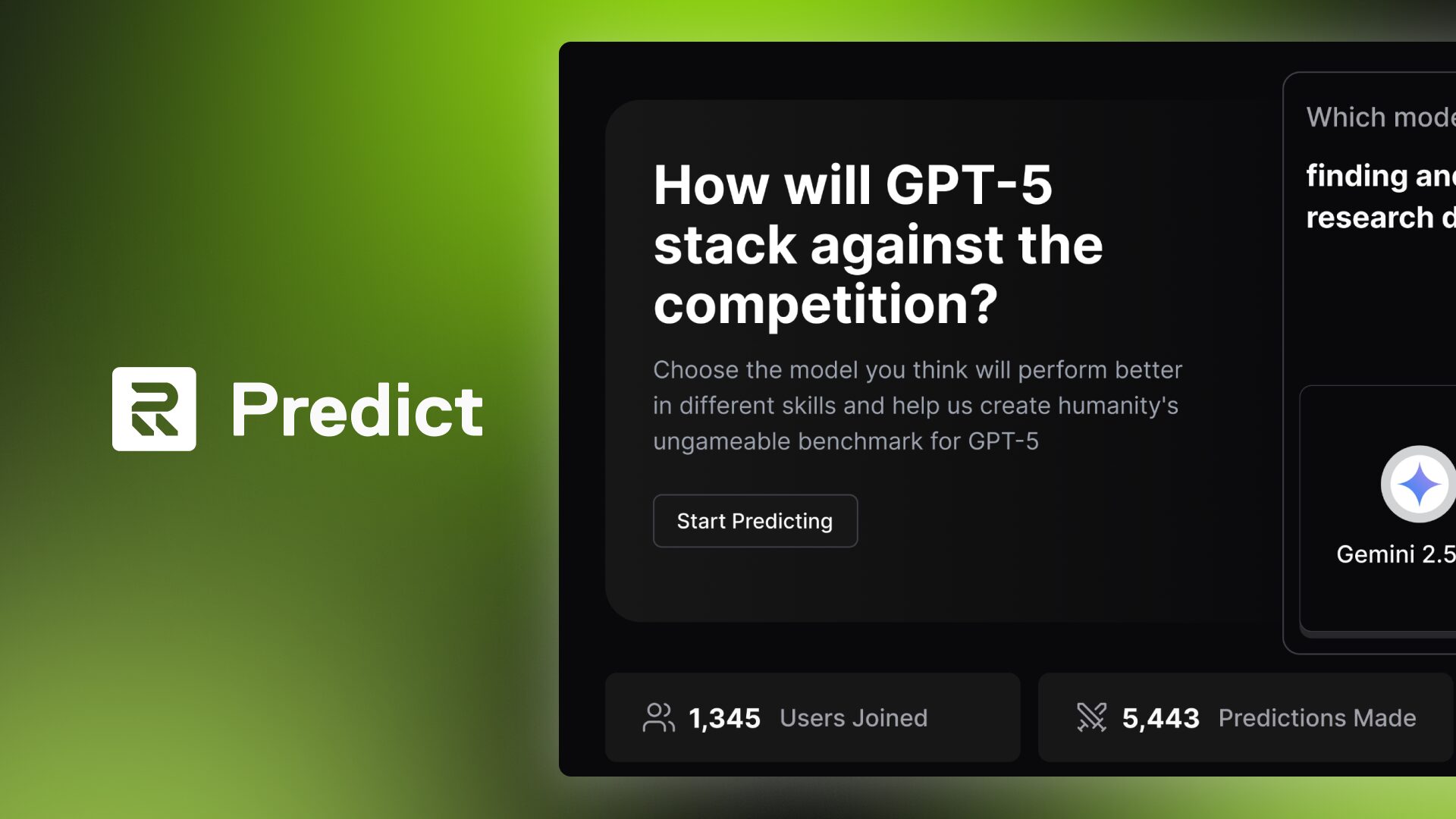
Table of Contents
Overview
In the rapidly evolving landscape of artificial intelligence, accurately evaluating the true capabilities of frontier models represents one of the most critical challenges facing the AI community. Enter Predict, by Recall – an innovative platform positioned as the world’s first ungameable, community-led benchmark specifically designed to address the limitations of traditional AI evaluation methods. As the AI industry anticipates the release of next-generation models like OpenAI’s GPT-5, scheduled for August 2025, Predict offers a novel approach that leverages collective intelligence to create transparent, bias-resistant evaluation frameworks for cutting-edge AI systems.
Key Features
Predict distinguishes itself through a carefully designed set of features that prioritize transparency, community engagement, and evaluation integrity:
- Community-led benchmarking: The platform harnesses collective intelligence from AI researchers, developers, and enthusiasts worldwide, creating evaluation frameworks that reflect diverse expertise and real-world usage patterns rather than narrow academic or corporate perspectives.
- Ungameable evaluation design: A core architectural principle focused on preventing models from being specifically optimized for benchmark performance, ensuring evaluations reflect genuine capabilities rather than benchmark-specific training artifacts.
- Frontier model specialization: Purpose-built to evaluate next-generation AI models including GPT-5, Claude 4, and other upcoming systems, providing crucial insights into capabilities before widespread deployment.
- Collaborative evaluation ecosystem: Features an open environment where participants contribute evaluation prompts, submit skill assessments, and collectively validate benchmark tasks through transparent community processes.
- Rewards-based participation system: Implements a Fragment-based incentive structure where contributors earn points for predictions (5 points per prediction, 10 points for correct predictions, up to 2,500 points for top weekly accuracy), encouraging sustained community engagement.
- Private evaluation protocols: Maintains evaluation confidentiality until model release, preventing training data contamination and ensuring authentic capability assessment.
How It Works
Predict operates through a sophisticated community-driven methodology designed to ensure evaluation integrity and practical relevance. The platform enables participants to contribute evaluation tasks, predict model performance across various domains including coding, research, creativity, and reasoning, and validate results through collective oversight.
The evaluation process centers on community validation, where multiple contributors review and refine benchmark tasks before implementation. This collaborative approach helps identify potential biases, edge cases, and evaluation blind spots that traditional benchmarks might miss. Contributors can submit specialized evaluation prompts, participate in performance predictions, and engage in judging subjective qualities like helpfulness, creativity, and trustworthiness.
The platform’s ungameable design incorporates several safeguards: evaluation tasks remain sealed until model release, preventing gaming through targeted training; diverse community input reduces single-point-of-failure biases; and transparent methodology allows for peer review and continuous improvement of evaluation standards.
Use Cases
Predict’s community-driven approach makes it valuable across multiple applications within the AI development and research ecosystem:
- Frontier model capability assessment: Provides comprehensive evaluation of next-generation AI models like GPT-5, offering insights into performance across diverse domains before public release, enabling more informed deployment decisions.
- Bias detection and mitigation: Leverages diverse community perspectives to identify evaluation biases and model limitations that might be overlooked in traditional corporate or academic testing environments.
- Real-world performance prediction: Generates evaluations that better reflect actual usage patterns and user needs, as the community includes practitioners from various fields who understand practical AI applications.
- Research collaboration and knowledge sharing: Serves as a hub for AI researchers to collaborate on evaluation methodologies, share insights about model capabilities, and collectively advance the science of AI assessment.
- Transparent capability reporting: Promotes open and verifiable reporting of AI model performance, fostering greater trust and accountability in AI development through community-verified results.
- Early warning system: Identifies potential issues or unexpected capabilities in frontier models before widespread deployment, supporting responsible AI development practices.
Pros \& Cons
Advantages
Predict offers several compelling benefits that address fundamental challenges in AI evaluation:
- Enhanced evaluation transparency: The community-led approach ensures evaluation methodologies and results are open to scrutiny, reducing the opacity that characterizes many proprietary benchmarks and building trust through verifiable processes.
- Resistance to benchmark gaming: The ungameable design prevents the common problem where models are specifically optimized for benchmark performance rather than genuine capability improvement, leading to more authentic assessments.
- Diverse community expertise: Draws upon knowledge from thousands of practitioners across different domains, capturing evaluation perspectives that might be missed by homogeneous research teams or corporate evaluation processes.
- Adaptive evaluation framework: Community input allows for dynamic adjustment of evaluation criteria as AI capabilities evolve, ensuring benchmarks remain relevant and challenging rather than becoming obsolete.
- Early access to frontier model insights: Provides unique opportunities to evaluate cutting-edge models before public release, offering valuable intelligence for researchers, developers, and organizations planning AI adoption strategies.
Disadvantages
While innovative, Predict faces several challenges inherent to its early-stage development and community-driven approach:
- Limited operational track record: As a relatively new platform, there is insufficient long-term data to validate the effectiveness of its ungameable design and community governance model under diverse conditions.
- Scalability uncertainties: Questions remain about how effectively the community-driven model can scale while maintaining quality control and preventing coordination problems as participation grows.
- Dependency on community engagement: Platform effectiveness relies heavily on sustained, high-quality community participation, creating vulnerability to participation fluctuations or community dynamics issues.
- Evaluation standardization challenges: Community-driven processes may struggle to maintain consistent evaluation standards across different domains and contributor groups, potentially affecting result reliability and comparability.
How Does It Compare?
To understand Predict’s unique position in the AI evaluation landscape, it’s essential to examine how it differs from both established and emerging benchmarking approaches in 2025.
MLPerf represents the established enterprise approach to AI benchmarking. Managed by MLCommons, a consortium including major tech companies and academic institutions, MLPerf focuses primarily on training and inference performance across standardized workloads. MLPerf Training v5.0 introduced large language model benchmarks including Llama 3.1 405B, with over 200 submissions from 20+ organizations. While MLPerf excels at hardware performance comparison and system optimization, it emphasizes technical metrics rather than the nuanced capability assessment that Predict targets.
HELM (Holistic Evaluation of Language Models), developed by Stanford’s Center for Research on Foundation Models, provides comprehensive academic evaluation across 42 scenarios and 7 metric categories including accuracy, fairness, bias, and toxicity. HELM evaluates 30+ prominent language models under standardized conditions, offering rigorous academic assessment. However, HELM’s evaluation process involves limited direct community input in task creation and tends to focus on academic benchmarks rather than real-world usage patterns.
LMSYS Chatbot Arena has emerged as the leading community-driven evaluation platform, with over 1 million user votes comparing models through blind pairwise comparisons. Users engage in conversational interactions with anonymous models and vote for better responses, creating rankings based on real user preferences. This approach captures practical conversational quality but focuses primarily on chat interactions rather than specialized capabilities.
LiveBench addresses benchmark contamination by generating new, previously unseen questions monthly across reasoning, coding, and mathematics tasks. This contamination-free approach ensures models cannot be trained specifically for benchmark tasks, sharing Predict’s anti-gaming philosophy. However, LiveBench operates through automated generation rather than community curation.
Vellum AI Leaderboard specializes in evaluating state-of-the-art models released after April 2024, focusing on non-saturated benchmarks like GPQA Diamond and AIME 2025. This approach ensures evaluation remains challenging and relevant, but limits community involvement to consuming rather than creating evaluation content.
SciArena, developed by researchers including those from the Allen Institute, creates community-driven evaluation specifically for scientific literature tasks. With 23 models evaluated and over 13,000 researcher votes, SciArena demonstrates the viability of domain-specific community evaluation but focuses narrowly on scientific applications.
DataPerf, supported by MLCommons, focuses on data-centric AI evaluation, allowing the community to iterate on datasets rather than just model architectures. This approach shares Predict’s emphasis on community involvement but targets data quality rather than model capabilities.
Predict distinguishes itself by combining the community-driven approach of LMSYS Chatbot Arena with the anti-gaming principles of LiveBench, while focusing specifically on frontier model evaluation before public release. Its sealed evaluation protocol prevents training contamination while enabling community input in task design. Unlike domain-specific platforms like SciArena, Predict aims for broad capability assessment across multiple domains. The platform’s reward system and collaborative evaluation design create incentives for sustained community engagement beyond simple voting mechanisms.
This positioning makes Predict particularly valuable for evaluating unreleased frontier models where traditional benchmarks may be inadequate or compromised, offering a unique blend of community insight and evaluation integrity that complements rather than replaces existing approaches.
Final Thoughts
Predict, by Recall, represents a significant innovation in AI evaluation methodology, addressing critical gaps in how the community assesses frontier AI capabilities. As the AI landscape evolves with the anticipated release of GPT-5 and other next-generation models in August 2025, traditional benchmarking approaches face increasing challenges from optimization gaming, evaluation bias, and limited real-world relevance.
By pioneering an ungameable, community-led evaluation framework, Predict offers a promising solution to these challenges. Its emphasis on collective intelligence, evaluation transparency, and bias resistance provides a valuable complement to existing academic and industry benchmarks. The platform’s focus on frontier model evaluation fills a particularly important niche, offering insights into cutting-edge capabilities before widespread deployment.
However, as with any innovative approach, Predict’s ultimate success will depend on its ability to maintain community engagement, ensure evaluation quality at scale, and demonstrate long-term effectiveness in producing reliable, actionable insights. The platform’s early-stage status means many questions about its operational model remain unanswered.
For AI researchers, developers, and organizations seeking to understand the capabilities and limitations of next-generation AI systems, Predict offers a unique opportunity to participate in shaping evaluation standards and gaining early insights into frontier model performance. As the AI community continues to grapple with questions of safety, capability, and responsible deployment, community-driven evaluation platforms like Predict may play an increasingly important role in building trust, transparency, and collective understanding of AI system capabilities.
The success of Predict could establish a new paradigm for AI evaluation, one where the community plays a central role in defining what capabilities matter and how they should be measured, ultimately contributing to more robust, trustworthy, and beneficial AI development.

